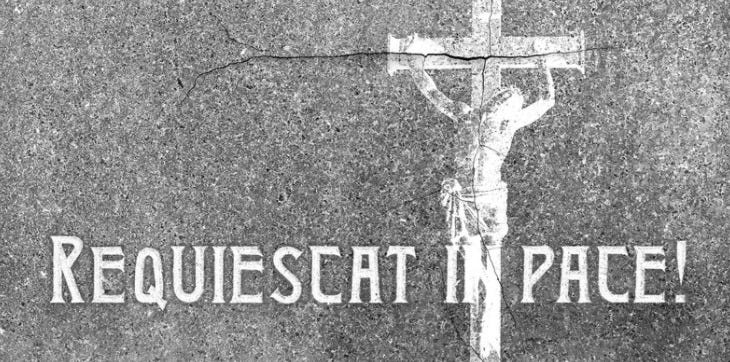What to Say to Someone Who’s Grieving
How an Unlikely Expression Became the Go-To Phrase for Mourners

Welcome to my newsletter, The Nonlinear Life. If you're new around here, read my introductory post.
Every Monday on The Nonlinear Life we talk about words to live by—popular sayings, mottos, buzzwords, proverbs, truisms, and aphorisms. Also, dad jokes! We call it Words4Life.
---
While the caustic downsides of digital communication and social media have been dominating headlines of late, I’ve recently experienced one of the underdiscussed benefits of being in such close communication with so many people around the world. When my father died three weeks ago, I heard from hundreds and hundreds of people who reached out by almost every means imaginable—condolence calls, telephone calls, hand-written notes, greeting cards, texts, gifts, social media comments, instant messages, DMs, even a LinkedIn contact request.
If you can use it to communicate with someone, I received a message through it.
Thank you.

I have been profoundly moved, deeply touched, occasionally puzzled (multiple texts from phone numbers my phone didn’t recognize), and even tickled by stories I didn’t knew. Mostly, I was amazed by the outpouring. And once I figure out the answer, I’m planning to write a post about the proper response to each of these different modes of communication.
But I was also struck by something else I didn’t expect: How a certain archaic phrase seems to have become the go-to expression for mourners of all backgrounds.
The question of what to say to those in grief is hardly new. If anything, it’s been a staple of etiquette books for centuries. The Emily Post website, perhaps the closest thing to modern gospel, recommends three expressions:
I am sorry for your loss.
I am so sorry.
I am here for you.
Perhaps the most iconic phrase on the internet these days in times of loss—rest in peace—was surprisingly unpopular in my comments. That could be because the phrase, an English spin on the Latin phrase requiescat in pace, became popular on Christian grave markers in the 18th century and never really caught hold among Jews. But I don’t think that’s quite the reason.

Rest in peace, or its more contemporary spin, rest in power, which emerged out of the California graffiti culture in the early 2000s, doesn’t feel like something you would say to a mourner. It feels like something you would say about someone who just died, especially in a eulogy, a written tribute, or a social media post.
Instead, by far the most common expression people used was May his memory be a blessing. This phrase, too, has a fascinating backstory. Proverbs 10:7 says “the memory of the righteous is invoked in blessing,” but the Hebrew phrase at the root of this English expression (zikhrono/zikhronah livrakha, depending on gender) actually comes from Talmudic times.
To my ear, I associate the phrase with Jewish grieving, but it’s clear from my own experience that usage has seeped into the broader culture. I’m not the only one who’s noticed this. A number of commentators observed on the death of Ruth Bader Ginsberg last year that May her memory be a blessing seemed to be moving beyond sectarian use. Roxanne Gay, who’s not Jewish but is married to a Jew, has on several occasions used the expression to honor Blacks killed by police officers.
In a beautiful essay in Tablet called “A Blessing Too Good for Jews Alone,” Sharrona Pearl, who teaches medical ethics at Drexel University, argues that the pandemic is what made this once-Jewish phrase go secular.
In a moment of overwhelming, immediate, and constant contact with death, this expression gives people something to say. Something powerful. Something meaningful, with the weight of history and tradition and sincerity behind it. This phrase, this script, which is readily available, offers comfort to those mourning while honoring those they mourn; it is a kind of gift for the digital age. And it feels like a necessity for the pandemic age.
May their memory be a blessing is a perfect thing to say because, with its echo of scriptural meter, it clearly sounds formal; but with its absence of overt religious signaling, it has the anonymity needed for an increasingly secular world. In short, it appeals to anyone and everyone.
And it’s clearly far superior to some of the items on Emily Post’s Do Not Say list:
Everything happens for a reason.
God does not give us more than we can bear
Did he have life insurance?
☀
Thanks for reading The Nonlinear Life. Please help us grow the community by subscribing, sharing, and commenting below. Also, you can learn more about me, read my introductory post, or scroll through my other posts.
You might enjoy reading these posts:
The President, the Pope, and the Future of Faith
Or these books: Life Is in the Transitions, The Secrets of Happy Families, Council of Dads.
Or contact me directly.




